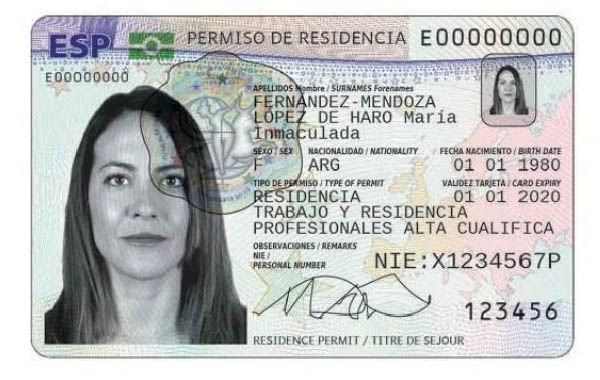 Foreigner identity card in Spain: everything you need to know
Foreigner identity card in Spain: everything you need to know
Complete guide on obtaining, renewing, and the obligations of the Foreigner Identity Card (TIE) for residents in Spain. Learn how to get your TIE, the necessary requirements, the renewal process, and your legal obligations as the holder of this document.
The Foreigner Identity Card (TIE) is a mandatory document for foreigners residing in Spain for a period exceeding six months. This card certifies the legal status of the foreigner and allows their identification in the country.
In addition, the TIE grants access to various services and rights, such as the possibility to work, access the healthcare system, and open a bank account. Below, we explain the most important points regarding its issuance, renewal, and the obligations it entails.
What is the foreigner identity card?
The Foreigner Identity Card (TIE) is an exclusive document that must be obtained by all foreigners who are legally in Spain and wish to stay for more than six months. This card is personal and non-transferable, meaning that only the holder can use it, and it must be requested within the first month after obtaining the visa or residence permit. The TIE not only certifies the legal status of the foreigner but also allows the authorities to verify the holder's identity and the status of their residence permit at any time.
This document is essential for foreigners to carry out daily activities, such as opening a bank account, signing an employment contract, accessing the public healthcare system, or renting a home. In short, the TIE is an indispensable requirement for fully and regularly integrating into Spanish society.
Requirements to apply for the foreigner identity card (TIE)
To apply for the Foreigner Identity Card (TIE), a series of requirements must be met and the corresponding documentation must be submitted. The main requirements are:
-
Valid passport or equivalent document that proves the applicant's identity and migratory status.
-
Recent photograph, in color and with a white background, that meets official standards. The photo must be clear and without elements that hinder the applicant's identification.
-
Resolution of the grant of the authorization or visa allowing the stay in Spain for more than six months.
-
Payment of the corresponding fees, which vary depending on the type of authorization being requested.
It is important to note that the TIE application must be made in person at the National Police Documentation Unit corresponding to your place of residence. It is also recommended to request an appointment in advance to avoid long waits and expedite the process.
Renewal and modifications of the card
Cases where renewal of the TIE is necessary
The renewal of the Foreigner Identity Card (TIE) is necessary in the following cases:
-
Modification of the residence permit.
-
Loss, destruction, or damage to the card.
-
Change in the recorded data, such as address or marital status.
In the event of a change of address or modification of any other relevant data, the holder must notify the competent authorities within one month of the change.
The renewal process involves resubmitting certain documents, such as the valid passport, a recent photograph, and the proof of payment of fees. In cases of loss or theft of the card, it is necessary to file a report with the police. It is important to remember that failure to comply with renewal obligations can result in penalties or difficulties in completing other procedures.
Procedure for applying for the TIE
The procedure for applying for the Foreigner Identity Card (TIE) includes the submission of the official form EX-17, duly completed, along with the required documentation. This form must be signed by the applicant.
Required documents
-
Official form EX-17 completed and signed.
-
Valid passport or equivalent document.
-
Recent photograph in color, with a white background.
-
Resolution of the grant of the permit or corresponding visa.
-
Proof of payment of the corresponding fees.
-
Updated certificate of registration, in case of change of address.
Presentation instructions
Minors must be accompanied by a duly accredited legal representative to complete the procedure. In the case of unemancipated minors or incapacitated individuals, the legal representative must also present their own documentation.
The application must be submitted at the Foreigners' Offices or at the Police Station of the province where the applicant has their residence. Follow the authorities' instructions carefully to avoid submission errors and ensure correct processing. In addition, once the card is ready, it must be collected in person at the indicated location, with a prior appointment, to ensure that only the holder or their representative can access it.
Legal obligations of the TIE holder
Holders of the Foreigner Identity Card (TIE) have the following obligations to maintain their regular status in Spain:
-
Carry the TIE at all times, as it is the main proof of the foreigner's legal status in the country.
-
Show the TIE when required by the authorities, whether during routine checks or any interaction with public bodies.
-
Notify changes in personal circumstances, such as a change of nationality, address, or marital status, to the competent authorities within a maximum period of one month. If required by the authorities, the deadline will be fifteen days.
Failure to comply with these obligations may result in penalties under Organic Law 4/2000 on the rights and freedoms of foreigners in Spain. These penalties may include fines and, in serious cases, the loss of the residence permit.
Application submission
The TIE application is submitted at the Foreigners' Offices or at the Police Station of the province where the foreigner has their residence. This process includes the in-person submission of documentation and, if applicable, a prior appointment to collect the card. It is essential to follow the established procedures and provide all the necessary documentation to avoid delays or problems in processing.
Once the application is submitted and the resolution is approved, the card will be issued and must be collected in person with a prior appointment. The applicant must prove their identity by presenting the passport or an equivalent document.



